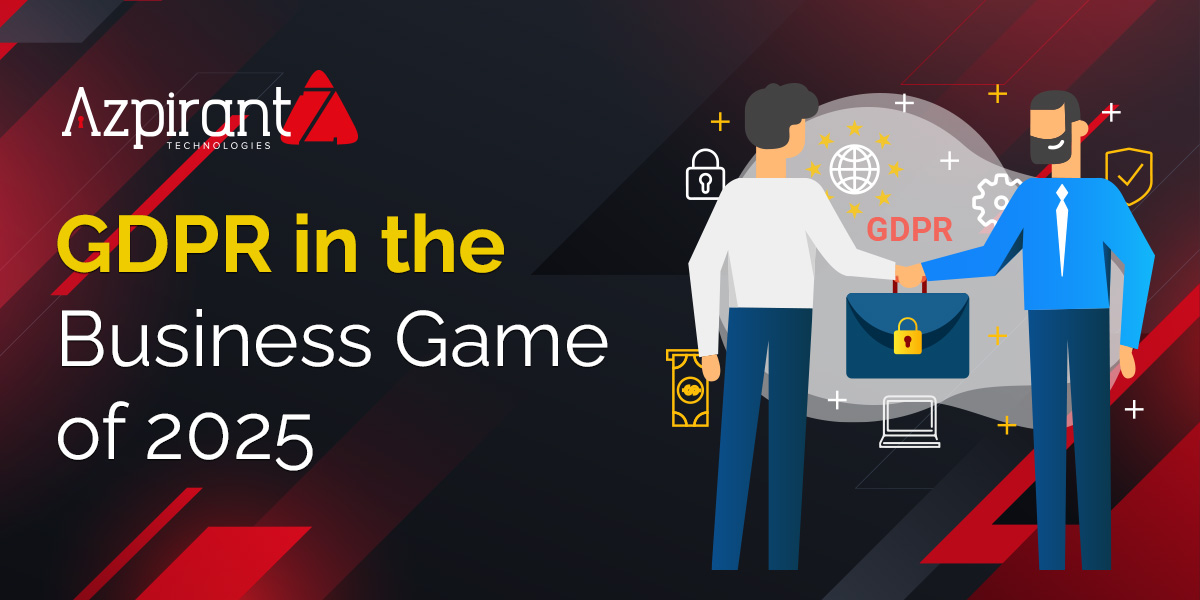Introduction: The Growing Importance of Data Privacy
In today’s digital world, businesses handle more personal data than ever before. Protecting that data is no longer just a technical issue—it’s a legal and reputational necessity.

The General Data Protection Regulation (GDPR), introduced by the European Union in 2018, set a global benchmark for data privacy and security. It gives individuals more control over their personal data and places strict obligations on organizations that collect, store, or process personal data.
As we move deeper into 2025, GDPR compliance remains critical, not just to avoid fines, but to build trust, ensure business continuity, and gain a competitive advantage. The GDPR trends for 2025 reflect growing enforcement, increased consumer awareness, and greater scrutiny on data usage, especially in the era of AI regulations and digital transformation.
This article breaks down what GDPR is, why it matters to businesses globally, and the key steps to achieve compliance in 2025 and beyond.
What is GDPR?
The General Data Protection Regulation (GDPR) is a comprehensive data protection law that governs how organizations handle personal data of individuals within the European Union (EU) and the European Economic Area (EEA).
Modern GDPR practices emphasize:
- Lawful, fair, and transparent data processing
- Data minimization (collect only what is necessary)
- Accuracy, accountability, and integrity
- Security and confidentiality of personal data
- Individual rights to access, correct, or erase data
Even businesses outside the EU must comply if they offer goods, services, or monitor behavior of EU citizens—this makes GDPR for startups and SMEs just as relevant as for large enterprises.
Why GDPR Compliance Should Be a Priority in 2025
1. Regulatory Fines and Enforcement
The GDPR enforcement landscape in 2025 is more aggressive than ever. Regulators are not hesitating to issue large fines, and business risks of GDPR non-compliance now include not just financial losses, but operational disruptions and reputational damage.
2. Shifting Customer Expectations
With data privacy awareness at an all-time high, GDPR compliance is not just a checkbox—it’s a brand trust signal. Businesses that adopt the future of GDPR proactively can create a significant business advantage in customer acquisition and retention.
3. Global Influence
New and evolving regulations around the world—like the AI Act, CPRA, and Saudi Arabia’s PDPL—mirror GDPR’s structure. Aligning with GDPR standards helps businesses future-proof against global data privacy laws.
4. Strategic Business Benefits
Surprisingly, GDPR compliance leads to stronger internal data governance, better decision-making, and improved customer experience. These are just a few of the GDPR business benefits that forward-looking organizations are leveraging in 2025.
5. AI and GDPR: A Critical Nexus
As artificial intelligence grows, concerns about automated decision-making and personal data profiling are under the spotlight. Navigating the fine line between GDPR and AI regulations is becoming essential for data-driven companies.
Common Mistakes Businesses Make
Even in 2025, companies continue to make avoidable errors, such as:
- Collecting personal data without valid consent
- Not updating privacy policies to reflect GDPR updates for businesses
- Ignoring data subject access requests
- Failing to prepare for breaches and enforcement inquiries
- Lacking an ongoing GDPR compliance checklist for 2025
Avoiding these pitfalls improves your data-driven business strategy and enhances resilience in an era of constant regulatory change.
Five Key Steps to GDPR Compliance
1. Conduct a Full Data Audit
Understand what data you collect, where it resides, who has access, and how it’s used. This is foundational for GDPR and emerging AI data protection laws.
2. Update Policies and Notices
Ensure privacy notices are transparent, accessible, and aligned with what’s new in GDPR regulations 2025.
3. Implement Advanced Security Controls
Encrypt sensitive data, enforce access controls, and test your systems regularly to meet evolving compliance demands.
4. Train Employees Continuously
Employees are your first line of defense. Regular training aligned with modern GDPR practices is a must.
5. Develop a Breach Response Plan
Preparedness is key. The 72-hour breach notification window under GDPR requires a clear, tested incident response plan.
How Azpirantz Helps You Turn GDPR Compliance Into a Strategic Advantage
At Azpirantz, we don’t just help you tick compliance checkboxes—we help you build a resilient, future-ready business. Our specialized Information Security Consulting services are designed to align your operations with evolving regulations like GDPR, while strengthening your overall security posture. From data audits and breach response planning to AI compliance and privacy-by-design strategies, Azpirantz enables you to treat GDPR not as a burden, but as a competitive edge in 2025’s data-driven economy.
Explore GDPR and security consulting services at Azpirantz
Conclusion: Data Protection is Business Protection
In an increasingly connected and regulated world, GDPR isn’t just a legal requirement—it’s a business enabler. Understanding how GDPR affects businesses in 2025, and using it as a strategic tool, can help you improve operations, strengthen trust, and fuel growth.
The role of GDPR in data-driven businesses will only increase, especially as AI, cloud computing, and digital ecosystems evolve. Instead of viewing it as a hurdle, embrace GDPR as a business advantage—a differentiator that sets you apart in the global market.